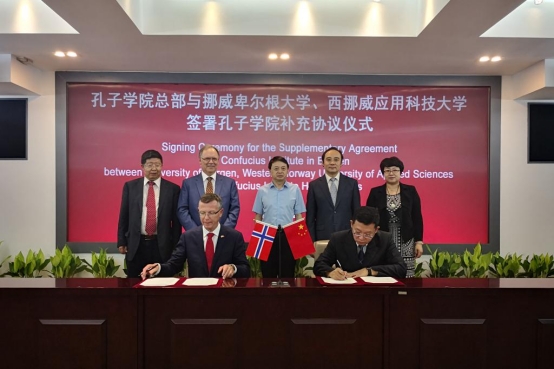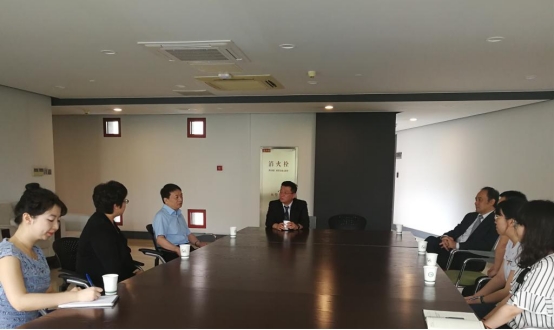In the morning of July 2, CUPL Vice President Ma Huaide was invited to visit Hanban/Confucius Institute Headquarters, during which he exchanged views with the University of Bergen (UIB) on joint-management of the Confucius Institute at UIB (the CI at UIB). Prof. Ma then attended the signing ceremony between the University of Bergen and Hanban Headquarter. Ma Jianfei, Deputy Chief Executive of the Confucius Institute Headquarters and Deputy Director-General of Hanban, Zhao Guocheng, Deputy Director-General of Hanban, Dag Rune Olsen, President of UIB, Jarl Giske, head of the Maritime Research In the Department Of Biology, Yang Jincheng, Director of the European Confucius Institute Division of Hanban, and Wang Feng, Deputy Director of European Confucius Institute Division of Hanban, also participated in the events.

During the meeting, Ma Jianfei spoke highly of the contributions that the CI at UIB had made to facilitate the friendly corporation between the two countries. He said that CUPL would contribute to the development of the legal strength of the CI. He also said that the Hanban Headquarter will encourage the CI to meet the local needs and to play the role of a cultural bridge between China and Norway. Dag Rune Olsen delivered a detailed introduction of the important role of the CI at UIB, as the only CI in Norway, in teaching, research and cultural exchanges. He also expressed great confidence in the extensive collaboration with CUPL, including the CI and on many other areas.

Vice President Ma Huaide reviewed the history of corporation between CUPL and Bergen, and expressed his hope for the two universities to develop extensive cooperation in multiple fields as well as to build the CI at UIB into an important platform for culture-exchanges between the two universities and the two countries. He hoped that the CI would make great contributions to the promotion of the Chinese language in the world and to the deepening of the friendship between China and Norway.
After the signing ceremony, CUPL became an official Chinese partner of the CI at UBI. Together with Beijing University of Physical Education, University of Bergen, and Western Norway University of Applied Sciences, CUPL will promote the steady development of the CI.
Then, Vice President Ma Huaide, accompanied by Ma Jianfei and Zhao Guocheng, met with Ph. D candidates Zhang Yilu and Man Xin, who were doing their internships in the General Office and the Development Planning Office of Hanban. Vice President Ma encouraged them to make good use of their professional knowledge and make contributions to the development of the proposed Legal Consultation and Support Base for International Promotion of the Chinese Language.

Xu Lan, Director of the Office of International Cooperation and Exchange, and Qu Xin, Deputy Director of Confucius Institutes Office of CUPL, also participated in the talks and the signing ceremony.
Extended Reading:Brief Introduction of University of Bergen, Norway
The University of Bergen (UIB) was founded in 1946 and is one of the most renowned universities in Norway. It is a member of the famous Coimbra Group in Europe. Formerly known as the Bergen Museum founded in 1825, the university is now the second largest comprehensive university in Norway. It is known for its diverse and high quality academic research, and the citation rate ranks first in Norway. UIB is a world-renowned research university and ranked 164 in QS World University Rankings in 2017.
The university has 7 faculties, including faculty of humanities, faculty of mathematics and natural sciences, faculty of medicine, faculty of dentistry, faculty of social sciences, faculty of law, and faculty of psychology. It has a total of 3,600 faculty members and 16,900 students, including 1880 international students. Ph. D. candidates of the university are also regarded as faculty members and enjoy the same salary. About one-third of the Ph. D. students in the school come from countries and regions outside Norway.

